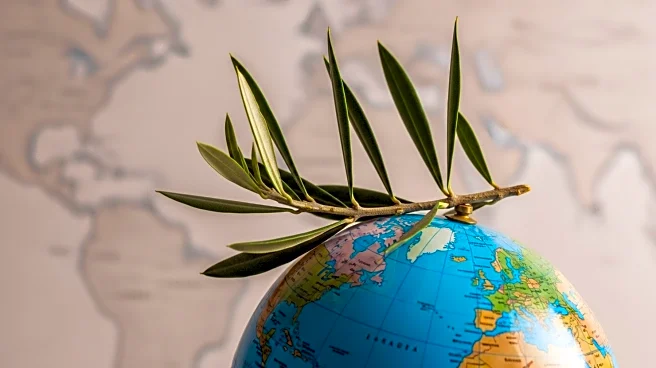What is the story about?
What's Happening?
The ongoing conflict in the Gaza Strip has intensified calls for international recognition of Palestinian statehood. This issue was prominently highlighted at the United Nations, where Riyad Mansour, the Palestinian ambassador, shared his perspective on the significance of statehood for Palestinians. The discussion comes amid heightened global pressure on Israel to cease hostilities, with Western powers increasingly advocating for Palestinian recognition. Mark Landler, the London bureau chief of The New York Times, elaborated on the implications of such recognition, particularly in the absence of support from the United States and Israel. The situation underscores the complexities of achieving peace in the region, as the new peace plan proposed by the U.S. and Israel does not include Palestinian statehood.
Why It's Important?
The recognition of Palestinian statehood carries significant geopolitical implications. It could alter the dynamics of Middle Eastern politics, potentially leading to shifts in alliances and diplomatic relations. For Palestinians, statehood represents a crucial step towards self-determination and international legitimacy. However, the lack of support from major powers like the United States and Israel poses challenges to achieving this goal. The situation in Gaza and the broader Israeli-Palestinian conflict continue to impact regional stability, with potential repercussions for global security and economic interests. Stakeholders in the region, including neighboring countries and international organizations, are closely monitoring developments, as any change in status could influence peace negotiations and humanitarian efforts.
What's Next?
The future of Palestinian statehood remains uncertain, with diplomatic efforts likely to continue at the United Nations and other international forums. The Palestinian leadership may seek further support from European and other Western nations to bolster their case for recognition. Meanwhile, Israel and the United States are expected to maintain their current stance, focusing on alternative peace initiatives that do not involve statehood. The international community will need to navigate complex political landscapes to address humanitarian concerns and foster dialogue between conflicting parties. Continued advocacy and negotiations are anticipated, as stakeholders aim to find a sustainable resolution to the conflict.
Beyond the Headlines
The quest for Palestinian statehood raises broader questions about international law, human rights, and the role of global institutions in conflict resolution. Ethical considerations regarding sovereignty, self-determination, and the rights of displaced populations are central to the debate. Long-term implications include potential shifts in international norms and the precedent set for other regions seeking recognition. The situation also highlights the challenges faced by multilateral organizations in balancing political interests with humanitarian needs.
















